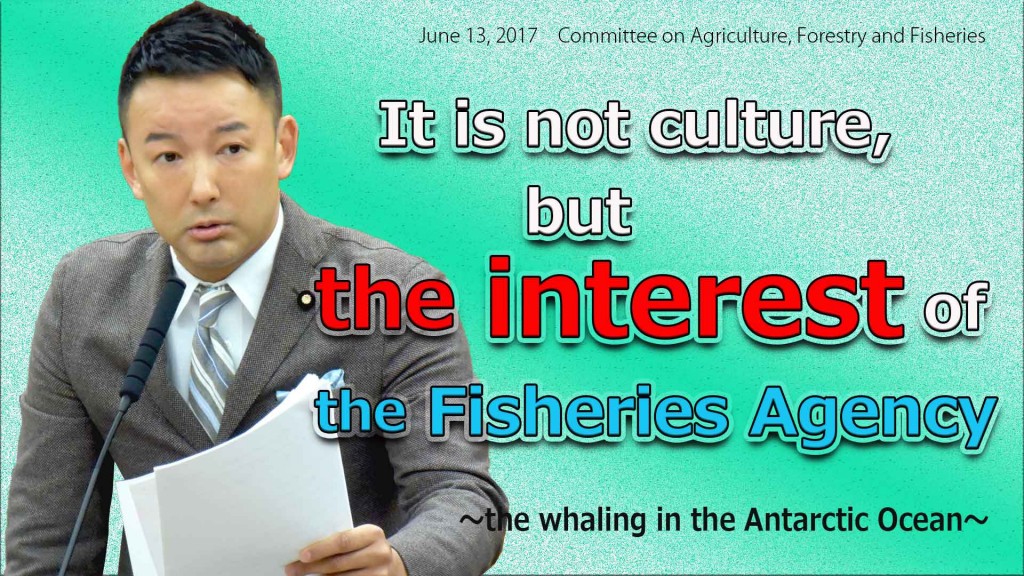Welcome to IKAN

Stop Issuing “Introduction from the Sea” Certificates; Stop Distributing Sei Whale Meat
November 5th, 2018
Prime Minister Shinzo Abe
Minister of Foreign Affairs Taro Kono
Minister of Agriculture, Forestry and Fisheries Takamori Yoshikawa
- The Standing Committee of the Convention on International Trade in Endangered Species of Wild Fauna and Flora (CITES) recognized by consensus that Japan’s introduction from the sea of sei whales was not in compliance with the Convention that forbids commercial distribution of species listed in the Appendix I, at its 70th meeting held in Sochi, Russia, on October 2nd.
- At the Standing Committee, the government of Japan, acknowledging the content of the report submitted by the CITES Secretariat, committed to take remedial actions by February 2019, report the measures to be assessed by the next Standing Committee, and not authorize any certificates for introduction from the sea of sei whales.
- Japan has harvested a total of 1622 sei whales to date from the high seas in the western North Pacific, landing approximately 1400 tons of sei whale meat every year for consumption, which are vacuum packaged and frozen onboard, in addition to specimens used for scientific research. This practice that has been in place since 2002, however, is now agreed it is a violation of the Convention.
We Oppose Japan’s “IWC Reform” Proposal
You can download pdf file of following leaflet.: ![]() (250KB)
(250KB)
Joint Statement NGOs call on Japanese Government to: Comply with CITES and Stop Distributing Sei Whale Meat
Prime Minister of Japan
Shinzo Abe
Minister of Foreign Affairs of Japan
Taro Kono
Minister of Agriculture, Forestry and Fisheries of Japan
Ken Saito
Minister of Environment of Japan
Masaharu Nakagawa
Most of the member countries at the committee denounced Japan, saying that bringing sei whale meat into the country is a violation of the treaty, and that this warrants a measure such as suspension of trade. None of the members supported Japan’s claims that it does not constitute a violation of the treaty.
The final decision will be taken at the Standing Committee meeting in October 2018. By the next Committee, in order to verify whether any violation of the treaty has occurred, the Secretariat will ask additional questions of Japan regarding those Japan previously failed to answer. Upon receiving the answers, the Secretariat will dispatch an investigation team to Japan.
Japanese NGOs urge political parties: Drop the proposed bill on Research Whaling, and stop wasting taxpayers’ money
JOIINT NGO STATEMENT
The “Bill On the Implementation of Cetacean Scientific Research for the Resumption of Commercial Whaling” (translation by IKAN) is a non-partisan bill that was first drafted by the opposition Democratic Party, but now aims to be passed by this Diet (Japanese Parliament) during their June session.
The objectives of the bill, as written, are to:
- Develop the Japan’s fisheries industry through implementation of commercial whaling, and
- Contribute to the sustainable use of marine organism resources.
However, the actual intent of the bill is to:
- Secure multi-year funding for research whaling
- Build a new whaling “mothership” to continue research whaling
- Roll out promotion campaigns for these specific industries using public funds, and
- Toughen immigration controls on foreign activists and shun global opinion.
There are two primary problems with the bill.
It's not culture, but the interest of the Fisheries Agency
An interpellation regarding Japanese whaling at the Committee on Agriculture, Forestry and Fisheries by Mr. Taro Yamamoto, a member of House of Councilors.
【Taro Yamamoto Official Article】
Committee on Agriculture, Forestry and Fisheries, Jun 13 2017.
Japanese NGO Joint Statement Regarding the International Whaling Commission’s meeting 66
October 18. 2016
Japanese NGO Joint Statement
Regarding the International Whaling Commission’s meeting 66
(Being held in Slovenia, October 20-28)
Statement translated from the original Japanese
Prime Minister Shinzo Abe
Minister of Agriculture, Forestry and Fisheries Yuji Yamamoto
Director-General of Fisheries Agency Kazuo Sato
We, Iruka & Kujira (Dolphin & Whale) Action Network, Greenpeace Japan and a collective of Japanese NGOs, request the Government of Japan to undertake the following:
1. Respect past resolutions adopted by the International Whaling Commission (IWC) and the ruling of the International Court of Justice (ICJ), and do not issue new permits intended to approve research whaling in Antarctica and the Northwest Pacific ocean, including for ‘coastal research whaling.’
2. Revoke the budget for restarting commercial whaling, since industrial whaling companies have already abandoned this as a viable business venture and there is no possibility of private firms newly entering this industry.
3. Reallocate the ¥5.1 billion budget currently allocated to research whaling and instead allocate this funding for research on coastal ecosystems and marine resources, to preserve the health of the sea.



